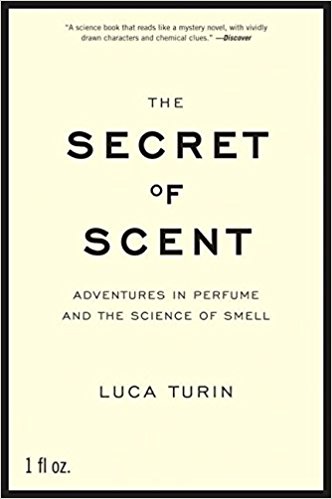| 商家名称 | 信用等级 | 购买信息 | 订购本书 |
 |
The Secret of Scent: Adventures in Perfume and the Science of Smell |  |
|
 |
The Secret of Scent: Adventures in Perfume and the Science of Smell |  |

One man's passion for perfume leads him to explore one of the most intriguing scientific mysteries: What makes one molecule smell of garlic while another smells of rose?
In this witty, engrossing, and wildly original volume, author Luca Turin explores the two competing theories of smell. Is scent determined by molecular shape or molecular vibrations? Turin describes in fascinating detail the science, the evidence, and the often contentious debate—from the beginnings of organic chemistry to the present day—and pays homage to the scientists who went before. With its uniquely accessible and captivating approach to science via art, The Secret of Scent will appeal to anyone who has ever wondered about the most mysterious of the five senses.
媒体推荐Turin writes brilliantly, with the easy confidence of the expert and the infectious enthusiasm of the true amateur. -- Tim Radford, The Guardian
作者简介Luca Turin holds a Ph.D. in biophysics from the University of London. Since 1996 he has worked on primary olfactory reception and the prediction of odor character. In 2001 he became chief technical officer of Flexitral, where he uses his theory of olfaction to design new fragrances and flavor molecules.
网友对The Secret of Scent: Adventures in Perfume and the Science of Smell的评论
This is one strangely, amazingly, delightful book. Turin's writing and his metaphors, his incredibly clever mix of high and pop culture and science are just priceless - I have never encountered anything like it. Although, full disclosure - I am a chemist, and I do wonder how much a reader who has not had some exposure to organic chemistry could appreciate it. But then again, half of his cultural references probably went right over my head so hopefully anyone not too science-phobic would get enough to have a great time with this book.
Now, a bit more wonky:
Turin did a fantastic job of convincing me that "molecular shape" cannot solely determine scent, as is, I think, widely accepted. I think this highlights a phenomenon that I have never heard discussed - scientists tend to accept as true whatever is the best theory available for any given purpose. The good ones are happy to take a better theory if it comes along, but until then, we go with what we've got - and sweep the dirt under the rug. We find it easier to admit we were wrong than that we are clueless.
SPOILER ALERT: if you are a scientist who plans to read this book, maybe stop reading at this point and please return after you read the book....
Unfortunately, Turin's own theory is lots of fun but, ironically, maybe an even better illustration of the problem of ignoring facts that don't fit the theory. If vibrational frequencies played an important role in olfaction, wouldn't extensive isotopic substitution completely change a molecule's smell? But the converse, when isotopic substitution does alter smell somewhat, does not argue that vibrational frequencies play any role, at least of the type he suggests. Isotopic substitution can have lots of subtle effects - including on binding - unrelated to the "spectroscopy" in Turin's theory. So, even after hearing only Turin's side of the story, I am convinced that the mainstream community is right about him being wrong. On the other hand he may also be right about them being wrong - and I'm sure his work is a lot more entertaining than theirs!
Follow-up: I just perused the paper by Turin et al. www.pnas.org/cgi/doi/10.1073/pnas.1012293108 PNAS | March 1, 2011 | vol. 108 | no. 9 | 3797-3802 The claim that "flies trained to discriminate against the normal or deuterated isotopes of a compound, selectively avoid the corresponding isotope of a different odorant" is very impressive! The paper seems like beautiful and important work, and even if the molecular vibration-sensing theory is wrong, they surely seem to be on to something.
Luca Turin has produced a wonderful volume on the world of perfume and the chemistry behind it.
The pages are packed with personal stories and wonderfully refreshing insights from Luca Turin's decades in the perfume business.
The material is very approachable, and I learned a lot reading the book.
One caveat, while this did not remove any stars for me, some people might be upset by his premise that we smell fragrances based on a complex vibrational analysis using quantum effects in the olfactory sensors.
I'm not convinced, but that did not spoil the book for me.
My favorite part of the book was the description of the various base scent categories and the types of molecules that made up the family of scents.
Brilliant!
Incredibly accessible and interesting writing from someone who has an advanced chemistry background. I never took chemistry and even I have very little trouble following along, as the author is terribly adept at shaping his concepts in a way that a person of average to above-average intelligence can follow. If you're interested in cooking, perfumes, or any other field that is heavily scent-oriented, this is a great book. He does write in sections that follow, one after another, rather than breaking the book into chapters, which can be a little be tedious on a reader psychologically, but his writing is cohesive and lively and he covers the topic well, with an exhaustive amount of citation one can refer to if interested in further perusing the subjects of chemistry and smell.
喜欢The Secret of Scent: Adventures in Perfume and the Science of Smell请与您的朋友分享,由于版权原因,读书人网不提供图书下载服务